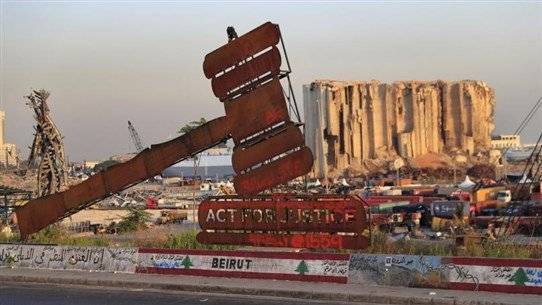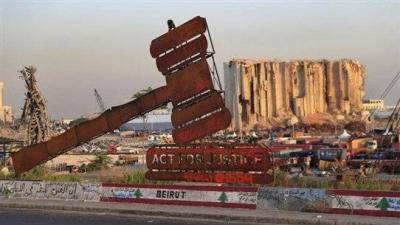As the families of the victims of the Beirut port explosion prepare to commemorate the second anniversary of the largest and most brutal crime in the nation's history, marked by considerable controversy on both judicial and security levels, the presence of the investigating judge in the case, Judge Tarek Bitar, at his office in the Palace of Justice after a forced absence of more than six months is noteworthy. He had suspended his investigations on December 23 after being informed of a petition to disqualify him from the case by MPs Ghazi Zaiter and Ali Hassan Khalil.
Upon his arrival, Bitar was informed of a motion to remove him filed against him by the General Director of Customs, Badri Daher, in addition to a joint petition to transfer the case filed by both the suspended accused, Chairman of the Beirut Port Investment Authority Hassan Qreitem, and the suspended port security head, Mohammed Ziad Al-Aouf, as well as a joint petition brought by the suspended accused, Salim Shibli, and his workers, and a transfer petition made by the suspended accused, Head of the Port Mohammed Al-Mawl.
Legally interpreting Judge Bitar's duty to attend, it is noted that his presence was at the request of the Court of Cassation. Judicial sources indicate that Bitar's decision to return to his office demonstrates his courage and a lack of intention to evade being notified of any petitions, which have reached a total of 35, including disqualification and transfer requests. However, these all seem to be obstructive to the investigation, regardless of the differences between disqualification and transfer both legally and in their underlying motives.
Lawyer from the Public Prosecution Office in the Bar Association, Youssef Lahoud, pointed out to "Al-Markazia" the necessity of distinguishing the backgrounds of the petitions, explaining that they may be arbitrary and in bad faith, or they could be based on good faith, with the plaintiff believing that filing the petition might lead to their release. However, it is clear that the disqualification petitions from ministers and prime ministers aim to obstruct the investigation. The President of the Republic is judged according to articles 60 and 70 of the constitution before the High Council for the Trial of Offenses of violating the constitution and treason, even for committing ordinary crimes. The trial of the Prime Minister and ministers for treason or failing to fulfill their obligations makes it not just a political court but also an exceptional criminal court, as its main duties lie in prosecuting the President of the Republic, the Prime Minister, and ministers for crimes against them.
Lawyer Lahoud denies knowledge of the reasons that prompted Judge Bitar to attend his office and be informed of the petitions, but based on his legal analysis, he speculates that "he might have attended out of transparency and no intention to evade being notified of the petitions, allowing the judiciary to take its course. This is a courageous move noted about Judge Bitar." However, being notified of new disqualification and transfer petitions "does not add anything to the matter, and he is determined to continue his mission until the last moment, regardless of the difficulties and obstacles."
The accumulation of petitions and the obstacles placed before the investigating judge to freeze and "suppress" the investigation does not mean "that the judicial investigation file is closed, but its course is slow, awaiting untangling the series that delays it," says lawyer Lahoud. He believes the solution "begins with forming the General Assembly of the Court of Cassation under the presidency of the Higher Judicial Council and the membership of judges from the Court of Cassation. Before this assembly, there is a state lawsuit against its president, Judge Nagy Eid, for his actions submitted by Ministers Ali Hassan Khalil and Ghazi Zaiter." Lahoud emphasizes that the state lawsuit is arbitrary and not based on legal foundations, but its goal is to freeze the petition requests which should be examined by the chamber presiding judge, Eid.
So far, Minister of Finance in the caretaker government, Youssef Khalil, refuses to sign a decree to complete the formation of the General Assembly of the Court of Cassation in preparation for adjudicating the transfer and disqualification petitions, which have reached 35, the majority of which have not been accepted. As a result, Judge Bitar can resume his investigations from where they left off, "and this is the beginning of a solution; as soon as the committee is formed, the state lawsuit against Judge Nagy Eid will be addressed regardless of the outcome, whether the decision is to reinstate him to his position heading the chamber or to remove him from it. In the end, the ruling is for the judiciary, and we are all under the law; the important thing is to sign the decree to form the General Assembly to adjudicate the disqualification petitions against Judge Bitar... and a solution is possible, knowing the backgrounds of the refusal to sign are known, but we hope it will happen soon."
What distinguishes transfer requests from disqualification is that the former does not automatically stop the judge’s hand, as the Criminal Procedure Code expressly states that this latter type of petitions does not suspend the investigation unless the court examining them explicitly decides so. This is somewhat favorable compared to disqualification requests, which immediately suspend the judge's presiding role," concludes lawyer Lahoud.
Two years after the explosion, the families of the victims and the Lebanese do not know more about the blast than what circulated in theories in the days following it. Justice could be the only comfort for the victims’ families, the injured, and the affected, albeit in varying degrees. However, it is also a distant specter... few believe that it will ever be achieved.




